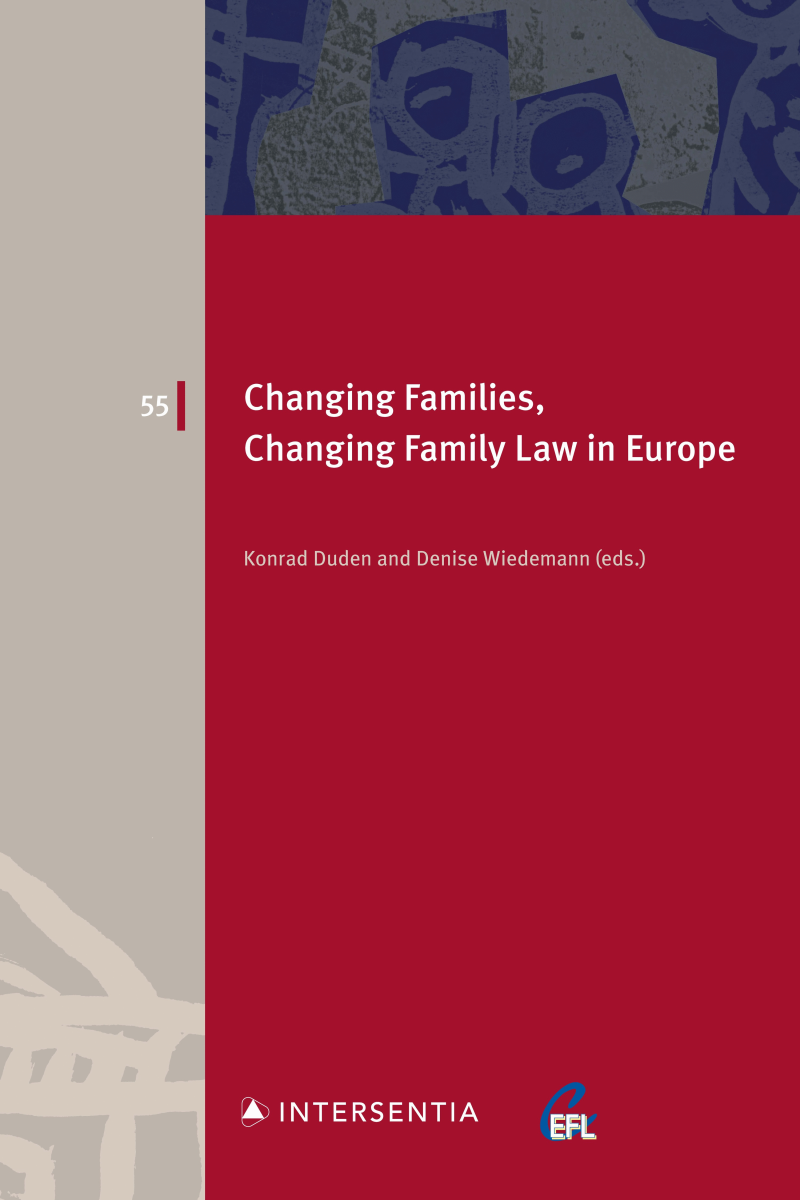 maestro
mastercard
visa
maestro
mastercard
visa

Changing Families, Changing Family Law in Europe

This book is available as an Open Access publication in e-book format. To access the e-book you can find the full pdf in the list of contents under the book description, or click the 'E-book' button on the right hand side of the page.
What constitutes a “family” in Europe? The answer to this question is constantly changing and increasingly varied. The standard of what a family looks like – a married, opposite-sex couple that lives with their biological children under the same roof and where the husband is the sole or primary bread-winner –has been eroding for a long time. The opening contributions to this book discuss rapid and substantial changes in family structures, concepts and values that have emerged in Europe in recent years. Conceptions of marriage and partnership have been affected by this change: from the increasing recognition of same sex-marriages, the acceptance of private divorce and the changing treatment of early marriages, to the increasing legal protection of partnerships outside of marriage. Transformation has also occurred in the area of filiation: assisted reproduction – particularly surrogate motherhood – is creating families that could not have previously existed. In some places, there is even discussion regarding granting parentage to more than two persons. Queer families add an additional layer of complexity: this starts with the recognition of the gender identities of transgender or non-binary persons, and continues with the question of the parentage of these persons. Finally, changing views of gender roles and a greater recognition of children’s rights make it necessary to reconsider the balance between the promotion of equality, self-reliance and autonomy of family members and the need to protect financially and physically vulnerable family members.
This book’s contributions display a fragmented situation across the European continent. In some areas the developments are marked by a clear divergence between Western and Eastern European jurisdictions. These differences between Eastern and Western European perceptions of family and gender identity have a tremendous symbolic and political importance and undermine efforts to harmonize (international) family law within Europe. Nevertheless, these differences should not be overstated, to avoid deepening the existing rifts even further. Instead, this book highlights ways of overcoming divergences through exploring conflict of laws, international civil procedure, human rights jurisprudence and even harmonized substantive family law.
About the editors
Konrad Duden is a full professor of private law and private international law as well as the director of the Institute for Foreign and European Private and Procedural Law at the University of Leipzig. He holds an LLM from the University of Cambridge and a PhD from the University of Heidelberg. His doctoral dissertation addressed the treatment of surrogate motherhood by private international law and was awarded various prizes (inter alia the Otto-Hahn-Medal of the Max Planck Society and the Gerhard-Kegel-Prize of the German Association of International Law). He wrote his postdoctoral dissertation (Habilitation) at the Max Planck Institute for Comparative and International Private Law in Hamburg on the influence of digitization on German property law.
Denise Wiedemann is a senior research fellow and the head of the Centre of Expertise on Latin America at the Max Planck Institute for Comparative and International Private Law in Hamburg. She is also a lecturer at Bucerius Law School and at the Universities of Leipzig and Hamburg, where she teaches, amongst other subjects, family and succession law. She completed her PhD thesis on cross-border enforcement of judgments in 2017. Her publications on family law include commentaries on the 1996 Hague Convention Child Protection and the EU regulations on property consequences of marriages and registered partnerships, as well as articles on child marriage and marriage by proxy.
| Type de produit | Livre |
|---|---|
| Format | Livre broché |
| EAN / ISSN | 9781839703805 / 9781839705021 |
| Nom de la collection | European Family Law |
| Poids | 609 g |
| Disponibilité | En stock |
| Nombre de pages | 362 p. |
| Avec exercice intégré | Non |
| Editeur | Intersentia |
| Langue | Anglais |
| Date de publication | 23 janv. 2024 |
| Disponible sur Strada Belgique | Non |
| Disponible sur Strada Europe | Non |
| Disponible sur Strada Luxembourg | Non |
Téléchargements
- Table of Contents and Front Matter
- Changing Families, Changing Family Law in Europe. Full Text
- Human Rights Protection in Family Reunification Law and the Recognition of Child Marriages
- The Recognition of Non-Judicial Divorces in Europe
- Emancipatory Potential of Maintenance and Matrimonial Property after Divorce: Reflections Based on the Concept of Relational Autonomy
- New Models for Family Solidarity between Unmarried Partners
- Surrogacy and Assisted Reproduction: A Challenge for Family Law and for Private International Law Methodology
- Three Models for Regulating Multiple Parenthood: A Comparative Perspective
- When Filiation Fails: Adoption as a Fallback Mechanism for Modern Family Forms?
- Gender Identity: A Comparative European Perspective
- Same-Sex Couples and EU Private International Law after Coman
- Trans(forming) Fatherhood? European Legal Approaches to ‘Seahorse Fatherhood’
- Cross-Border Child Protection Cases between Finland and Central-Eastern European States Including Russia
- The Challenges of the Hague Convention on International Child Abduction: Cases Involving Domestic and Family Violence
- Violence as National Heritage? The EU and CoE Strategies on Violence against Women and Domestic Violence
- A Fragmented Private International Family Law: Interactions and Intersections of International, European and National Norms
- Recognition and Enforcement in International Family Law: A Legal Patchwork or Systems Made to Measure?
- Party Autonomy in International Family Law: Choice of Law and Choice of Court as a Solution to the Challenges of Cross-Border Families
- A Look into the Future: The Harmonization of Substantive Family Law in Europe
- Concluding Remarks: Changing Families, Changing Family Law